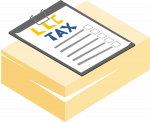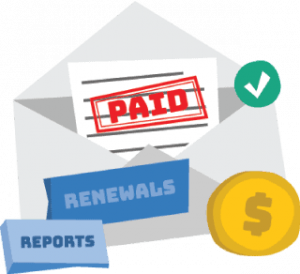Utah LLC Taxes
Utah LLCs are taxed as pass-through entities by default. Instead of paying taxes at the business level, LLCs pass profits and losses on to LLC members, who pay personal income tax on their earnings. As an LLC member in Utah, you'll pay both federal and state personal income tax, along with the federal self-employment tax of 15.3%. Utah collects personal income tax at a flat rate of 4.85%. Other taxes that may apply to your Utah LLC include the state’s 6.1% sales tax, industry-specific taxes, and employer taxes.
In this article, we’ll cover:


How Are Utah LLCs Taxed?
By default, a single-member LLC (SMLLC) is taxed as a sole proprietorship, and a multi-member LLC is taxed as a partnership at the federal level. In either case, you’ll pay individual income tax based on your income level and the 15.3% federal self-employment rate of (12.4% for social security and 2.9% for medicare). The self-employment rate applies to any salary you are paid, along with any distributions earned.
Federal tax forms:
- Single-member LLC—Form 1040 (usually Schedule C, but some SMLLCs file C-EZ, E, or F)
- Multi-member LLC—Form 1065
Utah LLCs can also elect to file as S-corps or C-corps, which will change how you file.
Utah LLCs taxed as S-corp
Filing as an S-corp can be advantageous for some LLCs, provided that your business meets all IRS requirements for S-corps. Despite being corporations, S-corps are not subject to federal or state corporate tax. Like LLCs filing under default status, S-corps are taxed as pass-through entities. However, while members of S-corps pay the 15.3% self-employment rate on salary, this tax doesn’t apply to any distributions earned, which can reduce the amount of tax paid on overall earnings.
To apply for S-corp status, file Form 2553 with the IRS. It’s also wise to consult a CPA before changing your filing status to ensure that S-corp election is right for your business. At tax time, you’ll report your income by submitting Form 1120-S.
LLCs taxed as C-corp
An LLC can also choose to be taxed as a C-corp, the default filing status for corporations. While this election isn’t popular among LLCs, under certain circumstances, C-corp status can offer your LLC some benefits. LLCs filing as C-corps are subject to the 21% federal corporate tax rate and Utah corporate income tax, paid at the entity level. However, C-corps are eligible for more tax breaks and are more attractive to investors.
Filing as a C-corp is significantly more complicated than filing under default status, so it’s a good idea to consult an accountant before making the switch. You’ll use Form 1120 to file your taxes with the IRS.

Utah State Income Tax
Filing under default status as a sole proprietor or partnership, you’ll pay Utah individual income tax at a rate of 4.85%.
LLCs filing as partnerships and S-corps don’t have to pay Utah corporate income tax, but they are subject to Utah’s income withholding tax. Utah requires pass-through entities to withhold income tax from taxpaying members at a rate of 4.85% and pay this tax to the state. Members can then claim withheld funds as a credit on their own income tax returns. Utah’s income withholding tax applies to all business income and all non-business income derived from Utah sources that is passed onto your LLC’s taxpaying members, resident and nonresident.
Utah imposes a 4.85% corporate income tax on all businesses filing as C-corps. C-corps with a Utah tax liability of $3,000 or more are required to make quarterly estimated tax payments after the first year.
Utah tax forms:
- Personal income taxes—Form TC-40
- Partnership taxes—Form TC-65
- S-corp taxes—Form TC-20S
- C-corp taxes—Form TC-20
If you prefer to file online, the Utah State Tax Commission provides a list of free and paid efiling services for personal income taxes. Business taxes can be filed through the Utah Taxpayer Access Point (TAP).

Sales and Use Tax
Utah charges a general state sales and use tax of 6.1% that must be collected from customers and then paid to the state. In addition to state sales and use tax, local governments are allowed to levy a local sales tax of up to 2.95%. Local rates vary by jurisdiction, but the average combined state and local sales and use tax rate is 7.19%.
Different sales and use tax rates apply to certain goods, particularly food. All grocery food is taxed at 3%, with no additional local sales tax. Prepared food at restaurants is taxed at the general combined sales and use tax rate plus 1%. In Salt Lake City, where the general combined sales and use tax rate is 7.75%, prepared food is taxed at 8.75%.
You can find specific combined sales and use tax rates using a current version of the Utah State Tax Commission’s sales and use tax rate chart, which is updated annually.

Local Utah Taxes
Local municipalities in Utah don’t charge income tax. In addition to local sales and use tax (discussed above), your LLC may need to pay property taxes. If your LLC owns property, you can find information on property tax rates and payment requirements through your local government.

Other Taxes in Utah
On top of federal, state, and local taxes, you may need to pay employer or industry taxes.
Utah State Employer Taxes
If you have employees, you must pay into unemployment insurance and purchase workers’ compensation coverage.
- Unemployment Insurance (UI) Tax—In Utah, you’ll need to pay unemployment insurance taxes on the first $44,800 you pay to each employee. New employers are assigned a UI tax rate based on the average rate in their industry. Employers with one or more fiscal years of reporting experience are assigned an earned rate ranging from 0.3% to 7.3% based on benefit ratio, reserve factor, and social cost. Details on rate calculation and UI tax registration can be found on through the Department of Workforce Services.
- Workers’ Compensation—With few exceptions, all Utah businesses with one or more employees must provide workers’ compensation insurance. LLC members are not considered employees in Utah, so if members do all the work for your LLC, you’re not required to obtain workers’ comp. However, you can choose to do so for extra coverage. You can purchase coverage through a private insurer or self-insure if you meet the qualifications and receive permission from the Utah Labor Commission Industrial Accidents Division. Rates for workers’ comp depend on the level of risk associated with your employees’ work and your claims history.
Industry Taxes
Depending on your industry, you may owe additional taxes to the state of Utah, including:
- Fuel Taxes
- Cigarette and Tobacco Taxes
- Motor Vehicle Taxes
- Wine and Liquor Tax
Find all of the Utah taxes and fees that apply to your business through the Utah State Tax Commission.

Do foreign LLCs in Utah need to pay Utah taxes?
Yes. If your out-of-state business has registered to operate in Utah as a Utah foreign LLC, you must pay all applicable taxes, just like a domestic Utah LLC. This includes withholding tax, sales and use tax, and employer taxes. However, you will not need to pay Utah personal income tax as a nonresident if filing as a partnership or S-corp.





